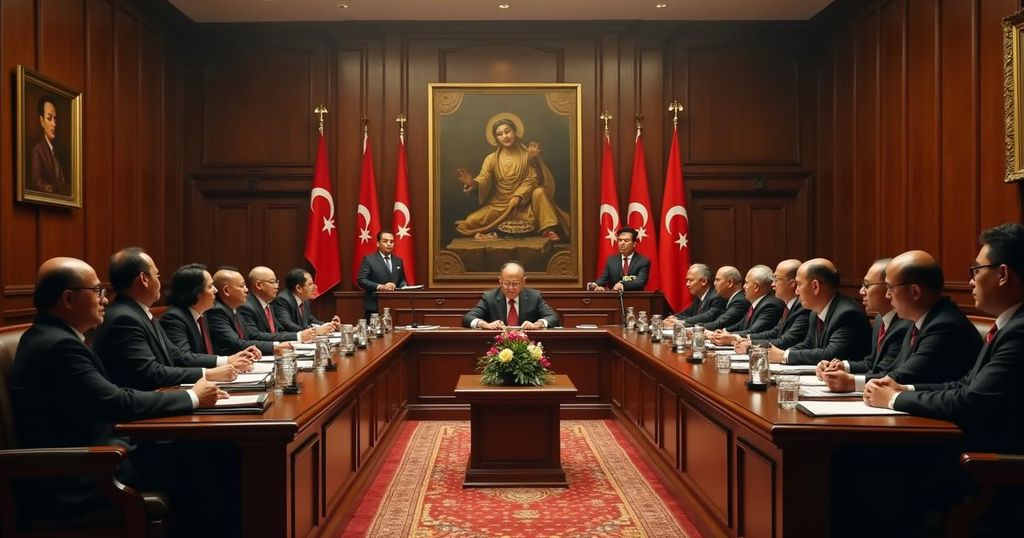International People’s Tribunal Holds Indonesia Liable for 1965-1966 Atrocities

The International People’s Tribunal in The Hague has declared Indonesia responsible for crimes against humanity during the 1965-1966 mass killings that resulted in the deaths of an estimated 500,000 to one million suspected communists. The tribunal’s findings emphasized ten significant human rights violations and called for the Indonesian government to apologize and investigate the actions taken by its military.
The International People’s Tribunal, convened in The Hague, has established that the Indonesian government bore responsibility for crimes against humanity related to the mass killings that transpired from 1965 to 1966. This tumultuous period resulted in the death of an estimated 500,000 to one million individuals accused of being affiliated with the Indonesian Communist Party (PKI). The tribunal’s verdict highlighted that these killings facilitated the ascension of former President Suharto’s New Order regime. In their final ruling, an international panel of judges identified a series of ten egregious human rights abuses committed during this timeframe—including not only genocide against PKI members and sympathizers but also against supporters of former President Soekarno and members of the Indonesian National Party (PNI). Presiding Judge Zak Yacoob stated, “The State of Indonesia is responsible for and guilty of crimes against humanity consequent upon the commission and perpetration, particularly by the military of that state through its chain of command, of the inhumane acts.” The tribunal enumerated additional human rights violations, such as destruction of property, unlawful imprisonment, slavery, torture, forced disappearances, sexual violence, wrongful banishment, dissemination of false propaganda, and international complicity in these acts. Judge Yacoob elaborated, asserting, “All these acts were an integral part of a broad widespread systematic attack against the Indonesian Communist Party, its affiliate organizations, its leaders, members and supporters and their families,” noting that the violence was instigated by misleading propaganda. The ruling further established that the Indonesian state is ultimately accountable for the actions of its military and affiliated groups, emphasizing a failure to prevent these atrocities or to punish those responsible. He posited, “To the extent that some crimes were committed independently of the authorities, by so-called ‘spontaneous’ local action, this did not absolve the State from the obligation to prevent their occurrence and to punish those responsible.” In conclusion, Judge Yacoob articulated a series of recommendations directed at the Indonesian government, including an apology to the victims and their families for the crimes committed in relation to the 1965 events, as well as urgent calls for investigation and prosecution of the perpetrators. There was a pronounced emphasis on the necessity for rehabilitation of the victims, protective measures against further persecution, and adherence to both international and Indonesian laws.
The 1965-1966 mass killings in Indonesia are marked by a violent military-led purge targeting suspected communists and their sympathizers, following a failed coup attempt. The purge resulted in widespread atrocities and has left a lasting impact on Indonesian society. The events were closely linked to the political rise of Suharto, who initiated a New Order regime characterized by authoritarian rule and anti-communist sentiment. Despite the enormity of the violence, accountability and acknowledgment of these crimes have been limited over the decades, making international scrutiny and calls for justice increasingly significant.
The verdict of the International People’s Tribunal serves as a pivotal acknowledgement of Indonesia’s historical atrocities committed during the mass killings of 1965-1966. It holds the Indonesian government accountable for a series of crimes against humanity and foregrounds the need for reparative measures, including public apologies and thorough investigations into the past. The tribunal’s recommendations highlight an urgent call for justice and reconciliation that Indonesia’s current administration must address.
Original Source: jakartaglobe.id








